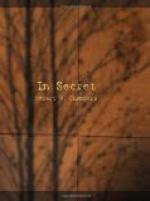“No, I think I won’t.” He continued on down the stone stairs, and Miss Erith ran to the rail and looked over.
“Are you armed?” she called through the darkness.
“Yes.”
He went on toward the rear of the silent house and through the servants’ hall, then around by the kitchen garden, then felt his way along a hedge to a hutchlike lodge where a fixed iron bell hung quivering under the slow blows of the clapper.
“What the devil’s the matter?” demanded McKay in a calm voice.
The bell still hummed with the melancholy vibrations, but the clapper now hung motionless. Through the brooding rumour of metallic sound came a voice out of the mist:
“The hours of life are numbered. Is it true?”
“It is,” said McKay coolly; “and the hairs of our head are numbered too!”
“So teach us to number our days,” rejoined the voice from the fog, “that we may apply our hearts unto wisdom.”
“The days of our years are three-score years and ten,” said McKay. “Have you a name?”
“A number.”
“And what number will that be?”
“Sixty-seven. And yours?”
“You should know that, too.”
“It’s the reverse; seventy-six.”
“It is that,” said McKay. “Come in.”
He made his way to the foggy gate, drew bolt and chain from the left wicket. A young man stepped through.
“Losh, mon,” he remarked with a Yankee accent, “it’s a fearful nicht to be abroad.”
“Come on in,” said McKay, re-locking the wicket. “This way; follow me.”
They went by the kitchen garden and servants’ hall, and so through to the staircase hall, where McKay struck a match and Sixty-seven instantly blew it out.
“Better not,” he said. “There are vermin about.”
McKay stood silent, probably surprised. Then he called softly in the darkness:
“Seventy-seven!”
“Je suis la!” came her voice from the stairs.
“It’s all right,” he said, “it’s one of our men. No use sittin’ up if you’re sleepy.” He listened but did not hear Miss Erith stir.
“Better return to bed,” he said again, and guided Sixty-seven into the room on the left.
For a few moments he prowled around; a glass tinkled against a decanter. When he returned to the shadow-shape seated motionless by the casement window he carried only one glass.
“Don’t you?” inquired Sixty-seven. “And you a Scot!”
“I’m a Yankee; and I’m through.”
“With the stuff?”
“Absolutely.”
“Oh, very well. But a Yankee laird—tiens c’est assez drole!” He smacked his lips over the smoky draught, set the half-empty glass on the deep sill. Then he began breezily:
“Well, Seventy-six, what’s all this I hear about your misfortunes?”
“What do you hear?” inquired McKay guilelessly.
The other man laughed.




